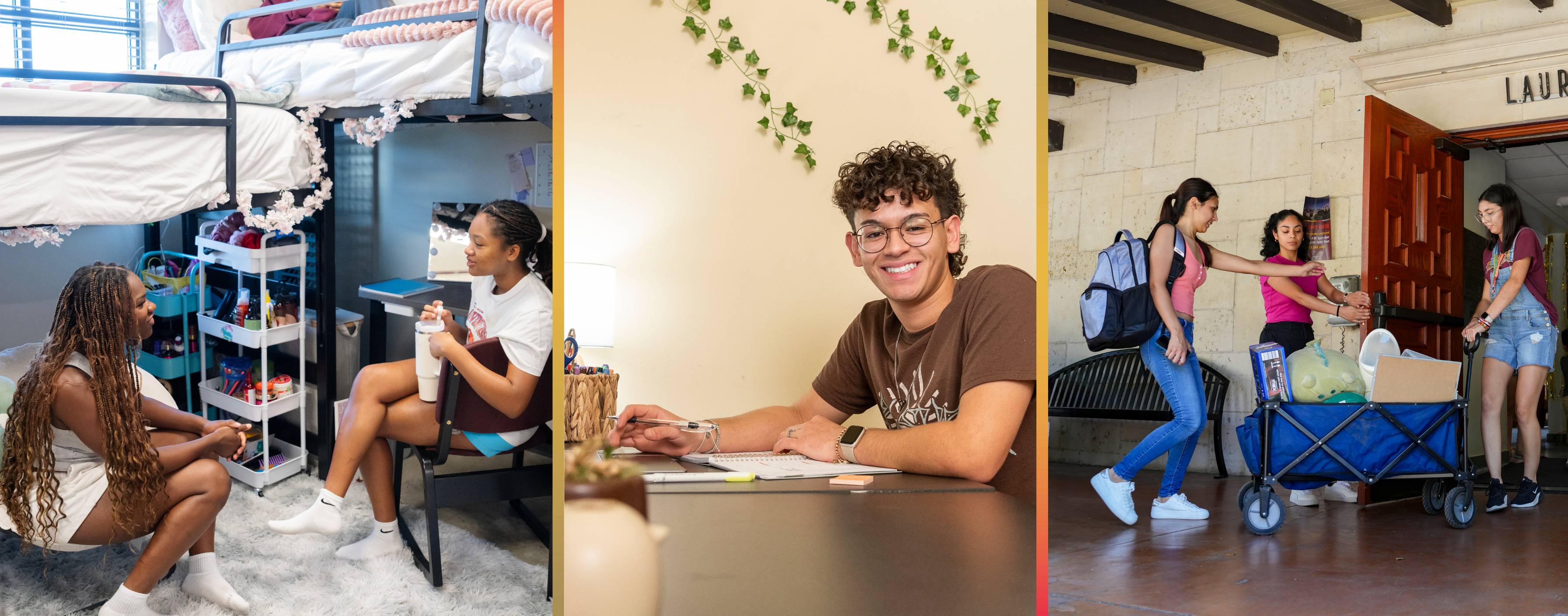Reporting Incidents
Texas State students and residents are responsible for knowing and following the student rights, responsibilities, and policies within the Living on Campus Handbook and Housing Contract as well as the Texas State Student Handbook. Students witnessing a violation of policy must notify hall staff. An incident report will be submitted and will be utilized to determine any alleged violations of the Living on Campus Handbook. Should alleged violations be present within the incident report, the report will then be turned into a conduct case within the Department of Housing and Residential Life’s conduct process. Upon creation, the case will be routed to a university administrator, typically the building’s Residence Director. Reports determined to be related to possession of weapons, illegal drugs, or assaults may be referred to the Student Conduct and Community Standards process within the Dean of Students Office.
Administrative Review Process
The Administrative Review Process is the judicial student conduct process through which hearing officers, traditionally Residence Director’s, gain more information about and address alleged violations of the Living on Campus Handbook. Housing and Residential Life (HRL) works with Student Conduct and Community Standards to address alleged policy violations through a consistent, timely, and educational process. Furthermore, the Administrative Review process is educational in nature and intends to provide students the opportunity to share their perspective of the situation, provide additional information, and have a reflective conversation about the alleged violations that may have occurred. Students who have allegedly violated the Living on Campus Handbook will receive notification of the alleged violations along with a meeting time scheduled during the business-day intentionally chosen to avoid disrupting their class schedule. An administrative review meeting will be hosted by a university administrator, typically a Residence Director. The appropriate university administrator will determine if the student is responsible or not responsible for violating policy utilizing the information from the initial incident report, the information shared within the Administrative Review Meeting, and any additional pertinent information provided by other students involved within the situation. If applicable, the university administrator will assign appropriate sanction(s).
In the event that a student fails to attend the Administrative Review meeting and does not attempt to reschedule within the timeframe provided to them, the case may be heard in their absence based on the information available.
In all cases, students who have potentially violated a policy are afforded due process, which includes the right to submit an appeal for any ruling made during an administrative review meeting.
Administrative Review Sanctions
Administrative Review Sanctions are intended to be educational and/or restitution based in nature.
Sanctions may include but are not limited to written essay, educational activities, community service, damage reimbursement, and other educationally focused assignments. Some sanctions may result in the suspension of rights and privileges for a specific period of time. This can include but is not limited to: access to electronic network facilities and participation in athletic, extracurricular or other student activities, and reassignment within the residential facilities.
If the student charged with a potential violation of the Living on Campus Handbook is believed to have taken actions that threaten the safety of themselves or someone else, the student may be required to move from their current room to another room on-campus, or they may be temporarily or permanently removed from on-campus housing. If the student is required to move off-campus due to the alleged actions, all costs incurred will be the responsibility of the student. Refunds will not be distributed for the paid residence facilities costs and the student will be responsible for payment of the remainder of the housing contract for the full academic year.
If the student fails to complete the assigned sanction responsibilities, a hold will be placed on their student account until the sanctions are completed and received following the instructions provided during the Administrative Review process. This may mean the student is unable to register, receive transcripts, or receive a diploma.
Administrative Review Appeals
Students found responsible for violating policy may appeal the decision and sanctions of their administrative review meeting regardless of whether they attended the Administrative Review meeting. Appeals are required to be submitted within five business days of the initial written decision of the corresponding administrative review meeting. New evidence, unsupported conclusion, disproportionate sanction, and procedural error are the only reasons for judicial appeals.
Upon submission, the appeal will be forwarded to the appropriate case manager for review. While the appeal is being reviewed the initial decision regarding the case is not considered final. Any sanctions that were assigned are considered on hold. During the sanction hold period, sanctions do not need to be completed and any expiring deadlines will not result in a student account hold. Appeals are reviewed and assigned to a Case Manager with no prior involvement within the initial incident or initial Administrative Review. The Case Manager will review the documentation that was submitted for consideration within this appeal as well as the original case and any documentation provided by the original hearing officer. The Case Manager will reach out to the appealing student with a pre-scheduled meeting opportunity to further discuss the appeal. This meeting will be automatically scheduled outside of a student’s class times.
The Case Manager reviewing the appeal has the following options available to them after the appeal meeting: deny the Appeal and uphold the original decision based on not satisfying the Appeal Criteria, accept the Appeal based on satisfying the Appeal Criteria and drop the case, or modify sanctions and uphold the original decision based on satisfying the Appeal Criteria. Upon making a determination on the appeal outcome, the Case Manager will reach out with the outcome via Texas State email.
